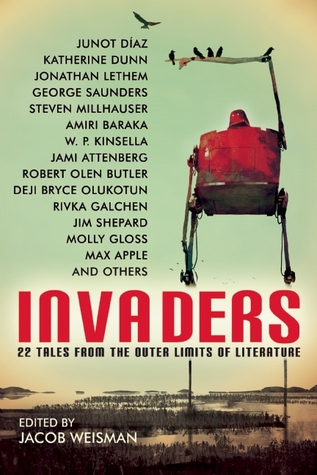The invasion of the future has begun.
Literary legends including Steven Millhauser, Junot Diáz, Amiri Baraka, and Katharine Dunn have attacked the borders of the every day. Like time traveling mad-scientists, they have concocted outrageous creations from the future. They have seized upon tales of technology gone wrong and mandated that pulp fiction must finally grow up.
In these wildly-speculative stories you will discover the company that controls the world from an alley in Greenwich Village. You’ll find nanotechnology that returns memories to the residents of a nursing home. You’ll rally an avian-like alien to become a mascot for a Major League Baseball team.
The Invaders are here. But did science fiction colonize them first?
Goodreads description
Whilst these stories are science fiction and not magic realism, many of the writers contributing to the anthology are already authors of magic-realist fiction, who have been invited to try their hands at speculative fiction. The resulting stories are remarkable and fascinating. One of the consequences of asking these literary authors to write sci-fi was there was generally a strong focus on the human element in the stories - relationships, sexual relations and indeed the nature of being human (something particularly appropriate to the sci-fi genre).
I have reviewed two of the stories already on this blog (The Inner City by Karen Heuler, and LIMBs by Julia Elliott) because they have featured in collections which also contained magic realism.
W.P. Kinsella normally combines baseball stories with magic realism; in Reports Concerning the Death of the Seattle Albatross Are Somewhat Exaggerated he offers a story about an alien living as a baseball maskot. In Monstros Junot Diaz (author of The Brief Wondrous Life of Oscar Wao) has created a powerful story about a plague (and zombies) set in the Dominican Republic.
W.P. Kinsella normally combines baseball stories with magic realism; in Reports Concerning the Death of the Seattle Albatross Are Somewhat Exaggerated he offers a story about an alien living as a baseball maskot. In Monstros Junot Diaz (author of The Brief Wondrous Life of Oscar Wao) has created a powerful story about a plague (and zombies) set in the Dominican Republic.
As you will have realized, the stories in the collection are very varied both in subject matter and in tone. This variety is reflected in my personal favourites, which include the aforementioned Kinsella story. While Death of the Seattle Albatross... is amusing and quirky, Fugue State by Brian Evenson and Escape from Spiderhead by George Saunders are darker and raise serious questions.
My favourite story was Molly Gloss's short story Lambing Season. As some of you will know, a literary heroine of mine is Ursula Le Guin. She is often categorized as a writer of science fiction and fantasy, but what attracts me to her writing is the ability to explore human nature and explore hard questions. Lambing Season reminded me of Le Guin's writings. It is a beautifully written and extremely human tale, in which a lonely shepherdess encounters an alien. This story is both gentle in touch and profound.
This collection really explores the outer limits of literature as it claims. I recommend it to you.
I received this copy of this book free in return for a fair review.
